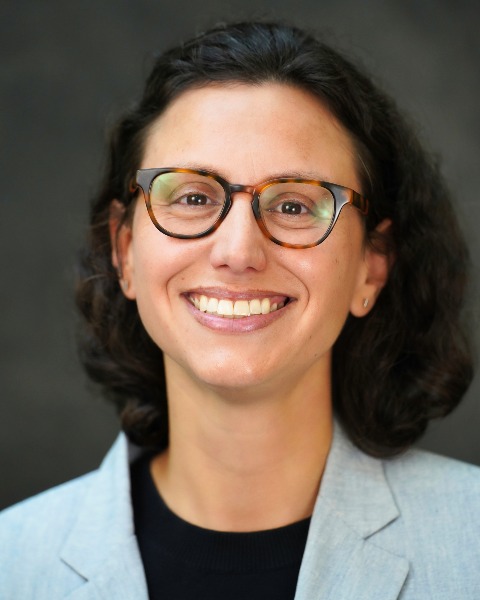Translational Research Evaluation
Telling the story of potential Impacts in clinical and translational science
-

Sue Giancola, PhD (she/her/hers)
Senior Associate Director, CRESP
University of Delaware
Newark, Delaware, United States -

Sue Giancola, PhD (she/her/hers)
Senior Associate Director, CRESP
University of Delaware
Newark, Delaware, United States -
BT
Bill Trochim, PhD
Professer Emeritus
Cornell University, United States -
MC
Mary Culnane, PhD
Policy Scientist
University of Delaware, United States -

Clara Pelfrey, PhD (she/her/hers)
Evaluation Director, CTSC
Case Western Reserve University
Shaker Heights, Ohio, United States -

Jessica Sperling, PhD
Director, Evaluation and Strategic Planning, CTSI
Duke University
Durham, North Carolina, United States -
SQ
Stella Quenstedt, MA
Program Manager & Research Analyst, CTSI
Duke University, United States -
PM
Perusi Muhigaba, PhD
Program Manager & Research Analyst, CTSI
Duke University, United States
Author(s)
Chair(s)
Disscussant(s)
Presenter(s)
Author(s)
Location: Room 208
Abstract Information: Understanding and measuring impact from funded clinical and translational research is becoming increasingly important as these projects develop, progress, mature, and recompete. In turn, translational research evaluators are challenged to plan and implement multi-level impact studies focusing on the individual, institutional, infrastructure, and community health levels. The translational science benefits model (TSBM) is a powerful framework for telling the story of impacts at multiple levels. For mature projects, evaluators can measure demonstrated clinical, community, economic, and policy impacts using TSBM. However, for many projects, it may take years to advance to demonstrated impact. This session will focus on evaluation strategies and approaches used by three evaluators to track and characterize potential clinical, community, economic, and policy impacts. The session will highlight how the translational science benefits model can be applied and operationalized to tell the story of potential impacts in clinical and translational science.
Relevance Statement: As evaluators of clinical and translational research programs, we are called to assess impact. Early on in these programs, providing feedback critical to facilitate sound implementation and inform continuous quality improvement is essential. Further, evaluators have a responsibility to build an infrastructure and culture of data-informed decision-making so that program leadership rely upon data for operational and strategic planning. Yet, these formative processes are intended to maximize the effectiveness of the program such that impact, in turn, can also be maximized. Traditionally, advisory boards of clinical and translational research programs are interested in public health impacts. The challenge to evaluators is measuring impacts for projects that may take years to have a demonstrated public health impact or where the public health impact is indirect. The Translational Science Benefits Model (TSBM) developed at Washington University in St. Louis is a powerful framework within which to examine both the demonstrated and potential benefits of clinical and translational research projects across multiple domains related to public health. This multi-paper session will focus particularly on experiences measuring potential impacts across the areas of 1) clinical and medical benefits; 2) community and public health benefits; 3) economic benefits; and 4) policy and legislative benefits. Presenters will explore how three programs have utilized the TSBM to examine potential public health impacts. Authors of the first paper share lessons learned from implementing the TSBM framework using investigator, institutional, and infrastructure case studies to examine potential impact in the four public health benefit areas. The author from the second paper explains how potential benefits can inform public health policy, and in turn, how evaluators can work with programs to teach investigators to use TSBM Toolkit resources to integrate impact thinking and planning into their work. Finally, authors of the third paper have been instrumental in developing the TSBM Toolkit and share multiple ways to conceptualize the way evaluators define potential impacts in public health. This session includes evaluators from Centers for Clinical and Translational Research and Clinical and Translational Science Institutes, however the information presented will be useful to any evaluator examining the impact of interventions that may take many years to realize demonstrated measurable impacts.
Presentations:
-
3:45 PM - 4:45 PM ETBut what counts as “potential”?: Identifying potential benefits across use cases and developing framework for defining “potential”
Presenter: Jessica Sperling, PhD – Duke University
Presenter: Stella Quenstedt, MA – Duke University
Presenter: Perusi Muhigaba, PhD – Duke University
-
3:45 PM - 4:45 PM ETDemonstrating translational science benefits to society
Presenter: Clara Pelfrey, PhD (she/her/hers) – Case Western Reserve University
-
3:45 PM - 4:45 PM ETNA
Presenter: Sue Giancola, PhD (she/her/hers) – University of Delaware
Presenter: Bill Trochim, PhD – Cornell University
Presenter: Stella Quenstedt, MA – Duke University
Presenter: Perusi Muhigaba, PhD – Duke University
-
3:45 PM - 4:45 PM ETPathways to "potential" impacts using the Translational Science Benefits Model
Presenter: Mary Culnane, PhD – University of Delaware
Presenter: Sue Giancola, PhD (she/her/hers) – University of Delaware
